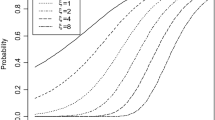Abstract
A major research direction for ability measurement has been to identify the information-processes that are involved in solving test items through mathematical modeling of item difficulty. However, this research has had limited impact on ability measurement, since person parameters are not included in the process models. The current paper presents some multicomponent latent trait models for reproducing test performance from both item and person parameters on processing components. Components are identified from item subtasks, in which performance is a logistic function (i.e., Rasch model) of person and item parameters, and then are combined according to a mathematical model of processing on the composite item.
Similar content being viewed by others
Reference Notes
Whitely, S. E. & Schneider, L.Process outcome models for verbal aptitude (Tech. Rep. No. NIE-80-1 for National Institute of Education grant NIE-6-7-0156). Lawrence, Kansas: Department of Psychology, University of Kansas, April, 1980.
Frederiksen, J. R.A chronometric study of component skills in reading (NR 154–386 ONR Tech. Rep. 2). Cambridge, MA: Bolt, Beranek & Newman, 1978.
References
Carroll, J. B. Psychometric tests as cognitive tasks: A new “structure of intellect”. In L. B. Resnick (Ed.),The nature of intelligence. New York: Lawrence Erlbaum Associates, 1976.
Egan, D. E. Testing based on understanding: Implications from studies of spatial ability.Intelligence, 1979,3, 1–15.
Fischer, G. H. The linear logistic test model as an instrument in educational research.Acta Psychologica, 1973,37, 359–374.
Kempf, W. F. Dynamic models for the measurement of “traits” in social behavior. In W. E. Kempf & B. Repp (Eds.),Mathematical models for social psychology. Bern: Hans Huber Publishers, and New York: Wiley, 1977.
Messick, S. Beyond structure: In search of functional models of psychological process.Psychometrika, 1972,37, 357–375.
Pachella, R. G. The interpretation of reaction-time in information-processing research. In B. H. Kantowitz (Ed.),Human Information-Processing: Tutorials in Performance and Cognition. Hillsdale, New Jersey: Lawrence Erlbaum Associates, 1974.
Pellegrino, J. W., & Glaser, R. Cognitive correlates and components in the analysis of individual differences.Intelligence, 1979.
Samejima, F. Normal ogive model on the continuous response level in the multi-dimensional latent space.Psychometrika, 1974,39, 111–121.
Scheiblechner, H. Das liernen und losen komplexer denkaufgaben.Z.f. exp.u. angew. Psychol., 1972,19, 476–505.
Snow, R. E. Theory and research on aptitude processes.Intelligence, 1978,2, 225–278.
Spada, H. Logistic models of learning and thought. In H. Spada & W. F. Kempf (Eds.),Structural models of thinking and learning. Bern, Switzerland: Hans Huber Publishers, 1977.
Sternberg, R. J. Component processes in analogical reasoning.Psychological Review, 1977,34, No. 4, 356–378(a).
Sternberg, R. J. The nature of mental abilities.American Psychologist, 1979,34, 214–230.
Whitely, S. E. Latent trait models in the study of intelligence.Intelligence, 1980,4, 97–132.
Whitely, S. E. Modeling aptitude test validity from cognitive components.Journal of Educational Psychology, in press.
Whitely, S. E. Information-processing on intelligence test items. Some response components.Applied Psychological Measurement, 1978,1, 465–476.
Whiteley, S. E., & Barnes, G. M. The implications of processing event sequences for theories of analogical reasoning.Memory & Cognition, 1979,1, 323–331.
Author information
Authors and Affiliations
Additional information
The author would like to thank David Thissen for his invaluable insights concerning this model and an anonymous reviewer for his suggestion about the sample space for the model.
This research was partially supported by National Institute of Education grant number NIE-6-7-0156 to Susan E. Whitely, principal investigator. However the opinions expressed herein do not necessarily reflect the position or policy of the National Institute of Education, and no official endorsement by the National Institute of Education should be referred. Part of this paper was presented at the annual meeting of thePsychometric Society, Monterey, California: June, 1979.
Rights and permissions
About this article
Cite this article
Whitely, S.E. Multicomponent latent trait models for ability tests. Psychometrika 45, 479–494 (1980). https://doi.org/10.1007/BF02293610
Received:
Revised:
Issue Date:
DOI: https://doi.org/10.1007/BF02293610




